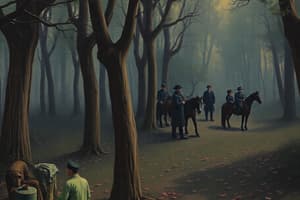Podcast
Questions and Answers
Which of the following BEST describes the relationship between militarism and the outbreak of World War I?
Which of the following BEST describes the relationship between militarism and the outbreak of World War I?
- Militarism decreased leading to diplomatic resolutions.
- Militarism fostered an environment where countries competed to build larger armies. (correct)
- Militarism led to global disarmament treaties, ensuring peace.
- Militarism focused solely on defensive strategies, preventing large-scale conflict.
How did the alliance system in pre-World War I Europe contribute to the escalation of the conflict?
How did the alliance system in pre-World War I Europe contribute to the escalation of the conflict?
- It meant that a conflict between two nations could quickly involve many more due to treaty obligations. (correct)
- It fostered a sense of collective security that reduced the likelihood of aggression.
- It created a clear and impartial system of international law that all nations respected.
- It encouraged cooperation among nations, preventing isolated conflicts from escalating.
Which of the following scenarios BEST illustrates the role of nationalism as a cause of World War I?
Which of the following scenarios BEST illustrates the role of nationalism as a cause of World War I?
- Countries establishing international organizations to promote peace and understanding.
- Nations agreeing to share resources and technology for mutual benefit.
- A country focusing on economic development alone, ignoring its cultural identity.
- A multi-ethnic empire experiencing internal tensions as various ethnic groups seek independence. (correct)
How did imperialism contribute to the outbreak of World War I?
How did imperialism contribute to the outbreak of World War I?
Which of the following technologies had the GREATEST impact on the scale of death and destruction during World War I?
Which of the following technologies had the GREATEST impact on the scale of death and destruction during World War I?
How did mass production and industrialism impact the nature of warfare during World War I?
How did mass production and industrialism impact the nature of warfare during World War I?
How did the Treaty of Versailles contribute to the rise of nationalism and totalitarianism in Germany?
How did the Treaty of Versailles contribute to the rise of nationalism and totalitarianism in Germany?
Which of the following BEST describes the purpose of the League of Nations?
Which of the following BEST describes the purpose of the League of Nations?
Which of the following factors contributed MOST significantly to the Russian Revolution of 1917?
Which of the following factors contributed MOST significantly to the Russian Revolution of 1917?
What was the PRIMARY impact of the Russian Revolution on World War I?
What was the PRIMARY impact of the Russian Revolution on World War I?
Flashcards
Militarism
Militarism
The belief a country should maintain a strong military and be prepared to use it aggressively.
Alliance System
Alliance System
Nations joined together to keep a balance of power before World War I.
Nationalism
Nationalism
Identification with one's own people and support for their interests.
Imperialism
Imperialism
Signup and view all the flashcards
German Reparations
German Reparations
Signup and view all the flashcards
League of Nations
League of Nations
Signup and view all the flashcards
Fourteen Points
Fourteen Points
Signup and view all the flashcards
Causes of Russian Revolution
Causes of Russian Revolution
Signup and view all the flashcards
Impact of the Russian Revolution
Impact of the Russian Revolution
Signup and view all the flashcards
Disarmament of Germany
Disarmament of Germany
Signup and view all the flashcards
Study Notes
- M.A.N.I.A. represents the causes of The Great War
Militarism
- Militarism is the belief in maintaining a strong military and using it to defend national interests.
- Countries competed to build larger, more powerful forces, contributing to a climate of tension and potential conflict.
Alliance System
- Nations formed alliances to maintain a balance of power.
- The Triple Alliance included Germany, Austria-Hungary, and Italy.
- The Triple Entente included Russia, France, and Britain.
Nationalism
- Nationalism is the identification with one's own people and support for their interests
- Multi-ethnic empires faced issues as people desired autonomy/independence; the Balkans and the Arab Uprising exemplify this.
Imperialism
- Imperialism is extending a country's power through diplomacy or military force.
- Nations competed for territories, resources, and imperial influence, leading to conflicts and rivalries.
Assassination
- A Serbian Nationalist Terrorist assassinated Archduke Ferdinand, triggering a chain of events that led to war.
Technology
- Advancements led to death on a catastrophic scale, with new strategies and innovations continuously developing.
- Weaponry advancements included airplanes, machine guns, submarines, and chemical warfare.
Mass Production, Industrialism, and Total War
- Industrial Revolution mechanized production led to the mass production of weapons.
Treaty of Versailles
- The Treaty of Versailles at the Paris Peace Conference, and its conditions gave rise to nationalism & totalitarianism.
- Fourteen Points served as a basis for the Treaty of Versailles, outlining America's terms for peace, including territorial adjustments and the establishment of a League of Nations.
- The "Guilt Clause" blamed Germany for the war.
- German Reparations included payments of $33 billion.
- Disarmament of Germany restricted the size and nature of their military.
- Decolonization forced Germany to give up lands in Africa & the Pacific islands.
- The League of Nations was organized to prevent future conflicts and promote disarmament & cooperation between nations.
Russian Revolution of 1917
- The Russian Revolution of 1917 had specific causes and a significant overall impact.
Causes of the Russian Revolution
- The people had no confidence in the imperial government.
- The 1905 Revolution caused tension & division between groups.
- There were major military losses in World War I.
- The Duma was dominated by nobles, resulting in the people having little representation.
- Inflation and food shortages impacted the population
- Vladimir Lenin promised “Peace, Land, and Bread”.
Impact of the Russian Revolution
- Abdication of Nicholas II & the end of Russian Czars.
- Rise of the Bolsheviks & the 1st socialist/communist government.
- Beginnings of the Soviet Union.
- Russia's removal from WW1.
- Spread of communism.
Studying That Suits You
Use AI to generate personalized quizzes and flashcards to suit your learning preferences.




